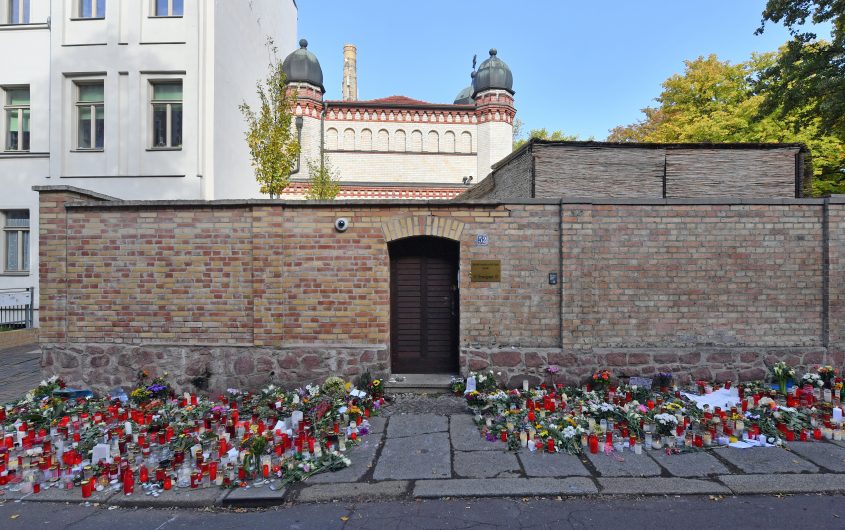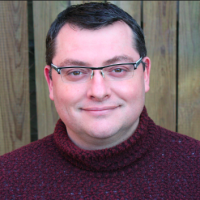
Hendrik Schmidt/picture alliance via Getty Images
On the Halle Synagogue Attacks

Eric Langenbacher
Senior Fellow; Director, Society, Culture & Politics Program
Dr. Eric Langenbacher is a Senior Fellow and Director of the Society, Culture & Politics Program at AICGS.
Dr. Langenbacher studied in Canada before completing his PhD in Georgetown University’s Government Department in 2002. His research interests include collective memory, political culture, and electoral politics in Germany and Europe. Recent publications include the edited volumes Twilight of the Merkel Era: Power and Politics in Germany after the 2017 Bundestag Election (2019), The Merkel Republic: The 2013 Bundestag Election and its Consequences (2015), Dynamics of Memory and Identity in Contemporary Europe (co-edited with Ruth Wittlinger and Bill Niven, 2013), Power and the Past: Collective Memory and International Relations (co-edited with Yossi Shain, 2010), and From the Bonn to the Berlin Republic: Germany at the Twentieth Anniversary of Unification (co-edited with Jeffrey J. Anderson, 2010). With David Conradt, he is also the author of The German Polity, 10th and 11th edition (2013, 2017).
Dr. Langenbacher remains affiliated with Georgetown University as Teaching Professor and Director of the Honors Program in the Department of Government. He has also taught at George Washington University, Washington College, The University of Navarre, and the Universidad Nacional de General San Martin in Buenos Aires, Argentina, and has given talks across the world. He was selected Faculty Member of the Year by the School of Foreign Service in 2009 and was awarded a Fulbright grant in 1999-2000 and the Hopper Memorial Fellowship at Georgetown in 2000-2001. Since 2005, he has also been Managing Editor of German Politics and Society, which is housed in Georgetown’s BMW Center for German and European Studies. Dr. Langenbacher has also planned and run dozens of short programs for groups from abroad, as well as for the U.S. Departments of State and Defense on a variety of topics pertaining to American and comparative politics, business, culture, and public policy.
__

Jackson Janes
President Emeritus of AGI
Jackson Janes is the President Emeritus of the American-German Institute in Washington, DC, where he has been affiliated since 1989.
Dr. Janes has been engaged in German-American affairs in numerous capacities over many years. He has studied and taught in German universities in Freiburg, Giessen and Tübingen. He was the Director of the German-American Institute in Tübingen (1977-1980) and then directed the European office of The German Marshall Fund of the United States in Bonn (1980-1985). Before joining AICGS, he served as Director of Program Development at the University Center for International Studies at the University of Pittsburgh (1986-1988). He was also Chair of the German Speaking Areas in Europe Program at the Foreign Service Institute in Washington, DC, from 1999-2000 and is Honorary President of the International Association for the Study of German Politics .
Dr. Janes is a member of the Council on Foreign Relations, the International Institute for Strategic Studies, the Atlantic Council of the United States, and American Purpose. He serves on the advisory boards of the Berlin office of the American Jewish Committee, and the Beirat der Zeitschrift für Außen- und Sicherheitspolitik (ZfAS). He serves on the Selection Committee for the Bundeskanzler Fellowships for the Alexander von Humboldt Foundation.
Dr. Janes has lectured throughout Europe and the United States and has published extensively on issues dealing with Germany, German-American relations, and transatlantic affairs. In addition to regular commentary given to European and American news radio, he has appeared on CBS, CNN, C-SPAN, PBS, CBC, and is a frequent commentator on German television. Dr. Janes is listed in Who’s Who in America and Who’s Who in Education.
In 2005, Dr. Janes was awarded the Officer’s Cross of the Order of Merit of the Federal Republic of Germany, Germany’s highest civilian award.
Education:
Ph.D., International Relations, Claremont Graduate School, Claremont, California
M.A., Divinity School, University of Chicago
B.A., Sociology, Colgate University
Expertise:
Transatlantic relations, German-American relations, domestic German politics, German-EU relations, transatlantic affairs.
__

Jeff Rathke
President of AGI
Jeffrey Rathke is the President of the American-German Institute in Washington, DC.
Prior to joining AGI, Jeff was a senior fellow and deputy director of the Europe Program at CSIS, where his work focused on transatlantic relations and U.S. security and defense policy. Jeff joined CSIS in 2015 from the State Department, after a 24-year career as a Foreign Service Officer, dedicated primarily to U.S. relations with Europe. He was director of the State Department Press Office from 2014 to 2015, briefing the State Department press corps and managing the Department's engagement with U.S. print and electronic media. Jeff led the political section of the U.S. Embassy in Kuala Lumpur from 2011 to 2014. Prior to that, he was deputy chief of staff to the NATO Secretary General in Brussels. He also served in Berlin as minister-counselor for political affairs (2006–2009), his second tour of duty in Germany. His Washington assignments have included deputy director of the Office of European Security and Political Affairs and duty officer in the White House Situation Room and State Department Operations Center.
Mr. Rathke was a Weinberg Fellow at Princeton University (2003–2004), winning the Master’s in Public Policy Prize. He also served at U.S. Embassies in Dublin, Moscow, and Riga, which he helped open after the collapse of the Soviet Union. Mr. Rathke has been awarded national honors by Estonia, Latvia, and Lithuania, as well as several State Department awards. He holds an MPP degree from Princeton University and BA and BS degrees from Cornell University. He speaks German, Russian, and Latvian.
__

Lily Gardner Feldman
Senior Fellow
Dr. Lily Gardner Feldman is a Senior Fellow at AICGS. She previously served as the Harry & Helen Gray Senior Fellow at AICGS and directed the Institute’s Society, Culture & Politics Program. She has a PhD in Political Science from MIT.
From 1978 until 1991, Dr. Gardner Feldman was a professor of political science (tenured) at Tufts University in Boston. She was also a Research Associate at Harvard University’s Center for European Studies, where she chaired the German Study Group and edited German Politics and Society; and a Research Fellow at Harvard University’s Center for International Affairs, where she chaired the Seminar on the European Community and undertook research in the University Consortium for Research on North America. From 1990 until 1995, Dr. Gardner Feldman was the first Research Director of AICGS and its Co-director in 1995. From 1995 until 1999, she was a Senior Scholar in Residence at the BMW Center for German and European Studies at Georgetown University. She returned to Johns Hopkins University in 1999.
Dr. Gardner Feldman has published widely in the U.S. and Europe on German foreign policy, German-Jewish relations, international reconciliation, non-state entities as foreign policy players, and the EU as an international actor. Her latest publications are: Germany’s Foreign Policy of Reconciliation: From Enmity to Amity, 2014; “Die Bedeutung zivilgesellschaftlicher und staatlicher Institutionen: Zur Vielfalt und Komplexität von Versöhnung,” in Corine Defrance and Ulrich Pfeil, eds., Verständigung und Versöhnung, 2016; and “The Limits and Opportunities of Reconciliation with West Germany During the Cold War: A Comparative Analysis of France, Israel, Poland and Czechoslovakia” in Hideki Kan, ed., The Transformation of the Cold War and the History Problem, 2017 (in Japanese). Her work on Germany’s foreign policy of reconciliation has led to lecture tours in Japan and South Korea.

Susanne Dieper
Director of Programs and Grants
Susanne Dieper is the Director of Programs and Grants at AICGS. She oversees the Institute’s programs and projects within the three AICGS program areas, manages all AICGS fellowships, and is in charge of grant writing. Her current focus is on issues related to transatlantic relations, immigration and integration, diversity, the next generation of leaders, workforce education, and reconciliation. She develops programs that align with the mission of AICGS to better understand the challenges and choices facing Germany and the United States in a broader global arena.
Previously, Ms. Dieper was in charge of organizational and project management at AICGS as well as human resource development and board of trustees relations. Prior to joining AICGS, she worked in transatlantic exchange programs, language acquisition, as well as the insurance industry in Germany.
Ms. Dieper holds an MBA from Johns Hopkins University with a concentration in International Business and an MA in English Linguistics and Literature, History, and Spanish from the University of Cologne. She has completed course work in nonprofit management at Johns Hopkins University.
__
Everyone in the AGI community grieves and condemns the right-radical, anti-Semitic terrorist incident that occurred on Yom Kippur, Wednesday, October 9, 2019, in the city of Halle. By now, the sequence of events and motivations of the killer are clear. Stephen Balliet, immersed in an international right-radical Internet subculture, assembled a (largely) homemade arsenal of weapons, drove to the synagogue in Halle as Yom Kippur services were underway, and tried repeatedly to enter the complex by breaking down a door—all of which he live-streamed. Frustrated by the sturdiness of the door, he shot to death a passerby, Jana L. and then drove to a cafe and killed twenty-year-old Kevin S. In an attempt to flee, the perpetrator shot and wounded two other victims, and led the police on a 50-mile chase until he was subdued and arrested. Two days later, he confessed to the crime and confirmed the right-wing, anti-Semitic motive.
Many aspects of the crime are all-too-familiar. There is the troubled, twenty-seven-year-old perpetrator, who lived socially isolated with his mother and did not have an arrest record. Beyond compulsory military service, little is known about him besides his radical on-line presence. Various documents and “manifestos” show that he was imbued with an anti-feminist, xenophobic, and anti-Semitic worldview and was consciously trying to imitate terrorist attacks such as the tragedies in Christchurch, New Zealand and El Paso, Texas. The ease of communication, proliferation of extremist propaganda, and internationalization of the right-radical fringe are once again inescapable take-aways.
Once again, there appears to be some failings from the government and police. Unlike other Jewish institutions across the country, there was no armed police presence at the time in Halle (despite a request) and the response time seems inadequate in light of several minutes when the perpetrator was using explosive devices and guns to try to gain access to the synagogue complex. A massacre of the worshippers was averted due to the ineffective homemade weapons, a security camera system, and a sturdy door. None of the killed and wounded after the failed attack were Jewish. One can only be nervous that one door—and perhaps Germany’s more stringent gun laws—averted much worse.
Finally, this incident shows that the scourge of anti-Semitism and (anti-Muslim) xenophobia is resilient. Too many people (troubled or not) are taken in by conspiracy theories and hate. This attack in Germany is especially unsettling, given the memory of the Nazi past and the substantial efforts that the country has made to come-to-terms with it and to foster a culture of contrition and vigilance to try to make such crimes unthinkable. Nevertheless, German authorities have recorded an increase in violent right-wing extremist crimes compared to years gone by, including those targeting Jewish people, as well as an increase in violent right-radical extremists in recent years. After years of focus on Islamist extremism, German security authorities have been brutally reminded of the threat of right-extremist violence, a threat that Germany must confront more vigorously.
German security authorities have been brutally reminded of the threat of right-extremist violence, a threat that Germany must confront more vigorously.
Perhaps official efforts to instill the culture of contrition (“never again”) and to foster liberal democratic political education are not as effective as they once were. It might be time for a comprehensive rethinking or at least an updating of pedagogical strategies. In light of the international informational flows that helped to radicalize the Halle perpetrator, it might also be time to look into ways to expand such socialization efforts to other countries—as well as developing more effective policy responses to on-line hate speech and violent right-radical organizing.
We ought not forget the response of official Germany. Chancellor Angela Merkel stated that there is zero tolerance for such acts. President Frank-Walter Steinmeier stated: “It must be clear that the state takes responsibility for Jewish life, for the security of Jewish life in Germany. We must protect Jewish life.” Many mainstream politicians placed some blame on the incendiary rhetoric of the right-wing Alternative for Germany. Bavaria’s interior minister even accused the politicians from that party of “intellectual arson.” Moreover, thousands of citizens attended a memorial service for the two victims and have expressed solidarity with the Jewish community. There are many more Germans who condemn such acts of terror than endorse them. But, condemnation also needs to be transformed into actions that check the threat of extremist violence.
Condemnation also needs to be transformed into actions that check the threat of extremist violence.
But, we also cannot overlook what is driving too many Germans to embrace these doctrines of hate and to act on them in murderous ways. AGI has always tried to provide insight into all aspects of contemporary Germany, including its memory culture and the rise of right-radical parties and movements. It is time to redouble our efforts to understand such issues, especially given the international and transatlantic dimensions so evident today. We will bring together practitioners and academics from both sides of the Atlantic to provide deeper insight into the issue complex surrounding anti-Semitism and right-radicalism through a series of conferences, talks, and publications.
It is all of our duty to make “never again” a continued reality.








